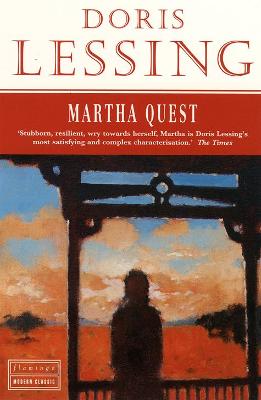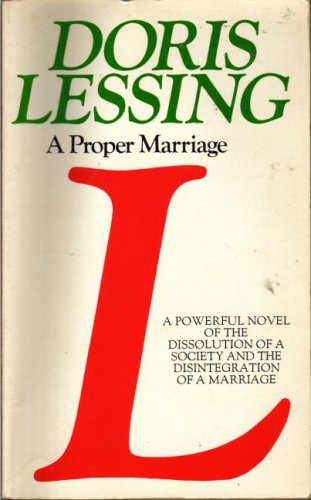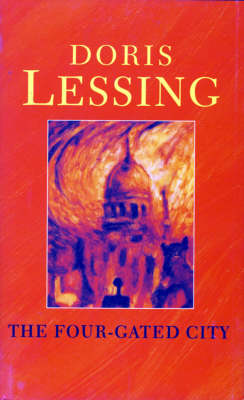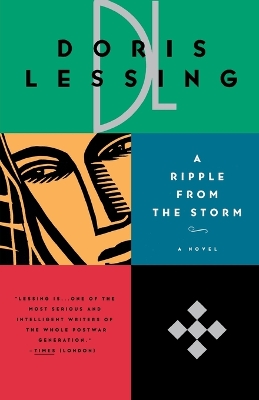Children of Violence
3 primary works • 5 total works
Book 1
The opening book in the Nobel Prize for Literature winner’s `Children of Violence’ series tracing the life of Martha Quest from her childhood in colonial Africa to old age in post-nuclear Britain.
When we first meet Martha Quest, she is a girl of fifteen living with her parents on a poor African farm. She is eager for life and resentful of the deadening narrowness of home, and escapes to take a job as a typist in the local capital. Here, in the `big city’, she encounters the real life she was so eager to know and understand. As a picture of colonial life, `Martha Quest’ succeeds by the depth of its realism alone; but always at its centre is Martha, a sympathetic figure drawn with unrelenting objectivity.
Martha’s Africa is Doris Lessing’s Africa: the restrictive life of the farm; the atmosphere of racial fear and antagonism; the superficial sophistication of the city. And both Martha and Lessing are Children of Violence: the generation that was born of one world war and came of age in another, whose abrasive relationships with their parents, with one another, and with society are laid bare brilliantly by a writer who understands them better than any other.
Book 2
The second book in the Nobel Prize for Literature winner's `Children of Violence' series tracing the life of Martha Quest from her childhood in colonial Africa to old age in post-nuclear Britain.
`A Proper Marriage' sees twenty-something Martha beginning to realise that her marriage has been a terrible mistake. Already the first passionate flush of matrimony has begun to fade; sensuality has become dulled by habit, blissful motherhood now seems no more than a tiresome chore. Caught up in a maelstrom of a world war she can no longer ignore, Martha's political consciousness begins to dawn, and, seizing independence for the first time, she chooses to make her life her own.
Book 4
The fourth book in the Nobel Prize for Literature winner's `Children of Violence' series tracing the life of Martha Quest from her childhood in colonial Africa to old age in post-nuclear Britain.
In the aftermath of the Second World War, Martha Quest finds herself completely disillusioned. She is losing faith with the communist movement in Africa, and her marriage to one of the movement's leaders is disintegrating. Determined to resist the erosion of her personality, she engages in a love affair and breaks free, if only momentarily, from her suffocating unhappiness.
The fifth and final book in the Nobel Prize for Literature winner's `Children of Violence' series tracing the life of Martha Quest from her childhood in colonial Africa to old age in post-nuclear Britain.
`The Four-Gated City' finds Martha Quest in 1950s London and very much part of the social history of the time: the Cold War, the anti-nuclear Aldermaston Marches, Swinging London, the deepening of poverty and social anarchy. Daring to go a step further - as Lessing so often has in her career - the novel ends with the century in the throes of World War Three.
In the four previous novels of the `Children of Violence' series, Lessing explored the end of an epoch. Here she trains her gaze on the present - and the future. The disquieting power of her vision revealed across this series finds its culmination in this brave and visionary work.
The third book in the Nobel Prize for Literature winner's `Children of Violence' series tracing the life of Martha Quest from her childhood in colonial Africa to old age in post-nuclear Britain.
`"The personal life of a comrade would be arranged so that it interferes as little as possible with work," he said. Martha had not imagined that the "personal talk" with Anton would arise like an item on an agenda; she now felt frivolous because she had been looking forward to something different ...'
The 'Children of Violence' series established Doris Lessing as a major radical writer. In this third volume, Martha, now free of her stultifying marriage to Douglas, is able to pursue the independent life she has wanted for so long. Her deepening involvement with South African revolutionary politics draws her into a world of fierce commitments and passionate idealism. A time of great change, Martha's young womanhood brings not only immense happiness when she embarks on an affair with a fellow party member, but also great sorrow - for the pain of abandoning Caroline, her baby daughter, left at home with Douglas, never diminishes ...




